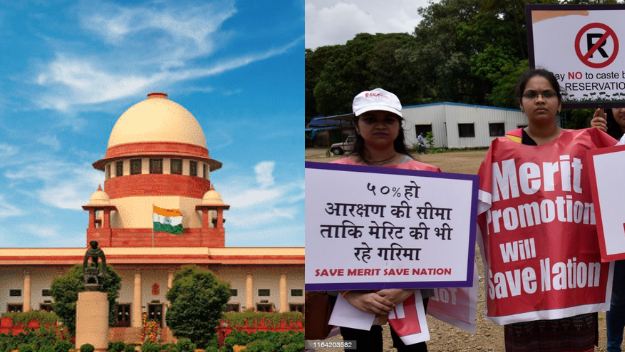In a heavy blow to all those arguing for increasing quota limits, Supreme Court thrashed the arguments of senior lawyer Mukul Rohtagi advocating for the states to increase the quota to whatever percentage they wish to. “If there is no 50% or no limit, as you are suggesting, what is the concept of equality? We will ultimately have to deal with it… What is your reflection on that?”, the court asked Senior Advocate Mukul Rohatgi who was arguing in favour of the Maratha reservation.
Moreover, the court also asked how long the quota will continue and what about the concept of equality if the state exceed the 50 per cent quota limit. A bench of senior justices which included Ashok Bhushan, L Nageswara Rao, S Abdul Nazeer, Hemant Gupta and Ravindra Bhat is hearing the arguments of Mukul Rohtagi (representing the Government of Maharashtra), who is arguing the 50 per cent reservation limit imposed in the Indira Sawhney case needs to be revisited.
“If there is no 50% or no limit, as you are suggesting, what is the concept of equality? We will ultimately have to deal with it… What is your reflection on that? What will be Article 14?… What about the resultant inequality? How many generations will you continue…?”, argued the bench.
The Union government of India has implemented a 27 per cent OBC quota and 22.5 per cent SC/ST quota in government-funded educational institutions and government jobs. Moreover, the states across the country have their own reservation systems which, in some cases, is above 70 per cent. The state governments want even that limit to be exceeded so that they can reserve almost all the seats in government jobs and government-funded education institutions to appease certain communities.
Moreover, another vicious cycle is starting of reserving the jobs in the states to the natives. Many regional party-run states like Andhra Pradesh, Telangana have implemented such reservation policies and some BJP run states like Haryana and Uttar Pradesh are catching up in this race to the bottom.
Read More: A massive exodus of industries is set to take place in Jharkhand after local Job Reservation bill
The fact remains that even if a quota is actually needed in the case of some of the states, the temptation of political leaders to replicate such quotas in their states in a politically charged atmosphere can never be ruled out. Especially, when polls are around the corner, the incumbent government might resort to a tactic of doling out such quotas. All this will end up putting unnecessary restrictions on the industry leaders limiting the talent pool they can choose from.
Due to various types of quotas, the talent pool becomes so short that the positions in educational institutions and government jobs remain vacant for years. Previously, IIMs, the premier management institutions of the country, which were granted autonomy under the IIM Act, 2017, has sought exemption from the implementation of reservation quota in faculty appointments. In a letter to the education ministry, the IIMs requested an exemption from quota as the “Institutions of Excellence” mentioned in the Central Educational Institutions (Reservation in Teachers’ Cadre) Act 2019.
If this vicious cycle does not stop, the government, as well as the educational institutions, would be filled up with a bunch of incompetent and inefficient people.
